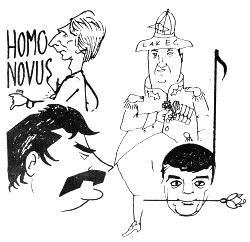Jaunā Gaita nr. 136, 1981. g. 5. numurs
JG 136
The lead article in this issue is by Ojārs Krātiņš, Professor of English at the University of California at Berkeley. His essay, "Subjectivism and a Few Consequences," was first presented in Rīga on December 26, 1980. In it, he argues for a literary criticism based on the reader's psychology and his response to the text, rather than on "objective" and "scientific" methods of analysis, which too often serve merely to disguise the critic's subjectivity. In pedagogy, the "objective" approach leads to an authoritarian lecture system and the consequent reduction of the student's role in understanding a text to the absorption of the lecturer's ideas. In contrast, the "subjective" method favors a question-and-discussion format for classes, in which the student is encouraged to develop his own interpretations at the same time as he must accommodate the varying ideas of fellow students and the instructor. As Krātiņš points out, the former method may be traced back to Plato, and the latter to Protagoras. He demonstrates that subjectivism is better suited to the goals of education, for it promotes independent thought, toleration of others' opinions, and ethical autonomy in the student, thus helping him achieve intellectual maturity.
In "The Bicentennial of the Publication in Latvia of Kant's 'Philosophers' Bibles'" Jānis Ķēniņš reminds us that four of Kant's most significant works were first published in Latvia: the Critique of Pure Reason (Rīga, 1781), the Prolegomena to Any Future Metaphysics (Rīga, 1783), the Critique of Practical Reason (Rīga, 1788), and the Critique of Judgement (Libau / Liepāja, 1790).
Edīte Zuzena's "Maestro Anšlavs Eglītis and his Novels," a two-part essay beginning in this issue, is a study of an imposing figure in Latvian letters, the poet, comic dramatist, and novelist who last year received the National Prize of the World Association of Free Latvians. Zuzena discusses his credo as a writer, the elements in his biography which are reflected in his fiction, and his pre-war novel Homo novus. This work, Zuzena argues, is the first which shows many of his mature characteristics: his urbanism, his treatment of male - female relationships, his lack of eroticism and of sentimentality, his willingness to comment on the society around him, and his projection of himself into his fiction.
JG editor Kārlis Ābele contributes "Latvian Émigré Cultural Life in 1980," the latest in a series that has now been appearing for over ten years. He surveys events, performances, and awards in music, drama, and the fine arts on three continents: North America, Europe, and Australia.
"At Home with Učelīni and Aspazija - Drama at the Fifth World Latvian Youth Congress," by Baņuta Rubesa, is a review of three plays, Juris Rozītis' Par tabakas kaitīgumu (On the Harmfulness of Tobacco) and Māja (House), and Māra Rozītes' Rainis un Aspazija - Illūzijas (Rainis and Aspazija - Illusions). Tobacco is a serious farce which includes two clowns among its characters and which explores the experiences of two girls who defy their fathers' prohibitions and discover tobacco, alcohol, and men. More conventional in its nature, House is a soap opera which in its twenty-two scenes presents a year in the lives of four exile Latvians living in the same place. Both plays exhibit Rozītis' theory that drama should be therapy for an ailing society, the former through fantasy and satire and the latter through realism. Rainis and Aspazija - Illusions uses yet a third idiom. It portrays the lives of Latvia's famous literary couple from 1920 to Jānis Rainis' death in 1929 (with a brief scene devoted to Aspazija's death in 1943) through the memories of a woman who knew them as a young girl.
The reminiscences of Arnolds Nulītis form an important chapter in the history of the fine arts in Latvia. Nikolajs Bulmanis, Jr., has recorded them in "'Ziemeļzieds' ('Northern Flower'), the Mūksalas Studio, and the Mūksalas Artists' Association." The resulting essay traces the vital "Ziemeļzieds" movement from its origins among students at the Art Academy who were brought together in 1926 by their common admiration for Valdemārs Tone to its liquidation following the 1940 takeover of Latvia.
Also in this issue is a short review by Tālivaldis Ķiķauka of a performance in Toronto by Soviet Latvian composer-musician Raimonds Pauls and actor Imants Skrastiņš. We print as well an interview with Pauls.
The literary section in this issue includes poetry by Gunars Saliņš, Juris Kronbergs, Lidija Dombrovska, Margita Gūtmane, Rita Rumpētere, Valentīns Pelēcis, Māra Rozīte, Eduards Salna and Pēteris Zirnītis, and "Inheritance", a short story by Hēra Zaļinska.
Jānis Svilpis


